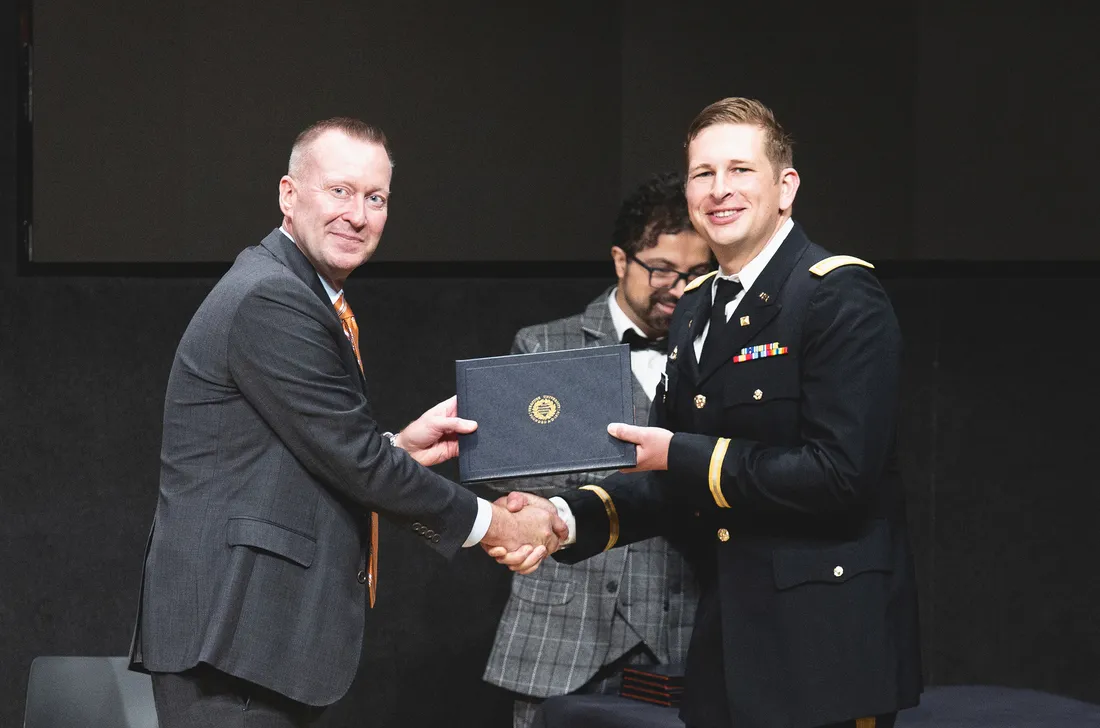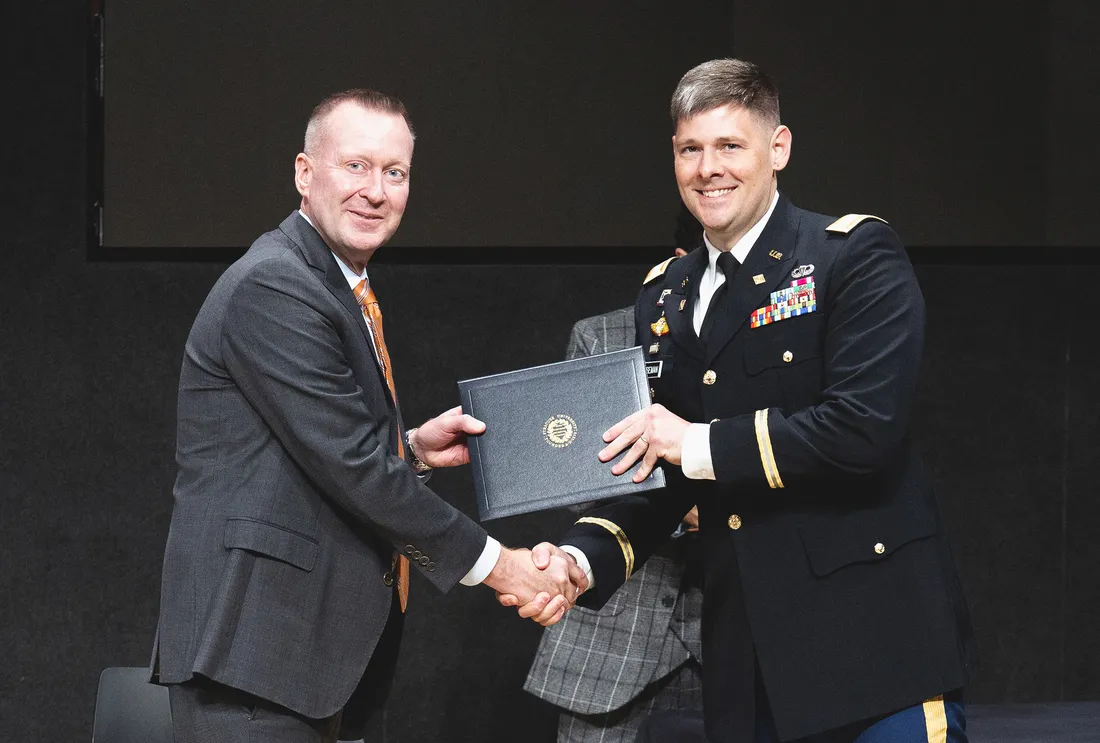
Previously called the Army Comptrollership Program, the Defense Comptrollership Program has had more than 2,000 graduates go on to make meaningful contributions in positions in federal, state and local governments, academic institutions, and the business sector.
Army Capt. Joe Schultz G’22 made sacrifices to attend the Defense Comptrollership Program (DCP) at Syracuse University in pursuit of his ultimate goal to lead his own nongovernmental organization. He’s been in Syracuse for the duration of the 14-month program while his wife, Gina, stayed in their home in Chicago. For him though, it was worth it. “The Defense Comptrollership Program has been a truly positive and life altering experience.”

Joe Schultz G’22, seen at the Defense Comptrollership program graduation ceremony with Michael Haynie, vice chancellor for Strategic Initiatives and Innovation.
Comptrollers are accounting and finance professionals who oversee the fiscal activity of businesses and government bodies. Since the 1950s, the DCP has trained comptrollers to handle financial resources for the U.S. Department of Defense (DOD).
A collaboration between the DOD and Syracuse University, DCP is the only program of its kind in the nation. Students in the program complete coursework to earn a master of business administration degree with a concentration in business analytics from the Martin J. Whitman School of Management and an executive master of public administration degree from the Maxwell School of Citizenship and Public Affairs.
Esteemed Program History
Since its establishment, DCP—previously called the Army Comptrollership Program—has had more than 2,000 graduates go on to make meaningful contributions in positions in federal, state and local governments, academic institutions, and the business sector. In addition to the 60-credit hour academic program—in which students take classes in fraud examination, accounting, public policy and project management—all students must take and pass the Certified Defense Financial Manager examinations.
Each class of this selective program consists of approximately 25 to 30 participants, chosen by the Army to apply, which includes active and Reserve military officers and civilian members of the comptroller profession from the Army, defense agencies and other services.
The thing that I really enjoyed about the DCP program was learning about public policy through the executive M.P.A. program at Maxwell, in addition to the deep learning about business with the MBA program at Whitman.
Jason Forte G’19
One such graduate is Jason Forte G’19. Forte is a management consultant for the firm GuideHouse where, among other responsibilities, he evaluates policy at government agencies. It’s something he enjoyed learning about during his time at Syracuse. “The thing that I really enjoyed about the DCP program was learning about public policy through the executive M.P.A. program at Maxwell, in addition to the deep learning about business with the MBA program at Whitman,” Forte says, adding that his favorite course was in foundational leadership.
“DCP allowed me to apply business analytics and business principles to what I already knew coming into the program and then learn the backside of public policy, which I really enjoyed,” says Forte, a former Army chaplain.
Delivering Practical Knowledge
Schultz served in the Illinois Army National Guard for the past five years, and prior to joining DCP he worked in logistics as a civilian before transitioning to a full-time military technician. Following graduation, he moved to Virginia to work at the National Guard Bureau with the Defense Travel Management Office, which operates the bookings and reimbursements system for soldiers when they use civilian transport. He thinks the data analysis and process improvement lessons he’s learned from DCP will be most applicable to his new position.

Each class consists of approximately 25 to 30 participants, chosen by the Army to apply, which includes active and Reserve military officers and civilian members of the comptroller profession from the Army, defense agencies and other services.
For Schultz, one of the most rewarding parts of the program was a volunteer weekend in which the cohort worked with representatives from the Army War College on an Arctic negotiation exercise involving treaty and drilling rights for the region. “The volunteer weekend was a great snapshot of being able to pull in all these different skill sets that I brought with me to Syracuse and the skills I gained or honed here. That was the crown jewel for my whole experience—being able to pull everything together and work with DCP peers,” Schultz says.
A Rewarding Challenge
Army Capt. Daniel Huseman G’22 had about five years of experience in finance when he first started the DCP program. He was an infantry officer before joining the finance branch of the Army as a finance detachment commander and NATO budget officer. Huseman holds a bachelor’s degree in political science from the University of North Carolina at Chapel Hill and says he’s very interested in the policy side of government finance. “Part of what made it really exciting to come to DCP is that I’d gain great analytical skills with the MBA, and I’d also get the policy and public administration courses,” Huseman says.
The exposure to new and complex data analytics concepts proved to be the most challenging part of the program for Huseman, but he’s learned a lot that will be useful going forward. Huseman says that Power BI, an interactive data visualization software product with a primary focus on business intelligence, will be particularly useful for future analytics work.

Daniel Huseman G’22, seen at the Defense Comptrollership Program graduation ceremony with Michael Haynie, vice chancellor for Strategic Initiatives and Innovation, is now teaching the Planning, Programming, Budgeting and Execution (PPBE) course at the Army’s financial management schoolhouse at Fort Jackson in South Carolina.
The work has paid off for each though. Huseman was assigned to the Army’s financial management schoolhouse at Fort Jackson in South Carolina after graduation. As an instructor there, he’s teaching the Planning, Programming, Budgeting and Execution (PPBE) course. “My goal is to work in D.C., in financial management at either the Department of Defense or Department of the Army, and I think this program and teaching the PPBE course will support that. The relationships that I’ve made in DCP will hopefully support that as well,” Huseman says.
Part of what made it really exciting to come to DCP is that I’d gain great analytical skills with the MBA, and I’d also get the policy and public administration courses.
Army Capt. Daniel Huseman G’22
Schultz says that for him the challenging aspect of the program was the rigorous workload—a sentiment echoed by Forte. “It’s not your gentleman’s course as we would call it in the Army—where you just show up and that’s it. It’s a top-notch program and a very challenging 14 months,” Forte says. “The benefits of rounding out your educational experience beyond the myopic view of the military makes the Department of Defense that much stronger. I’ve received numerous job interviews and job offers based on the credentials that came out of my DCP program,” Forte says.
Schultz echoes that sentiment. “If you have the requisite time and experience you should absolutely throw your hat into the ring because DCP is an excellent program. Every day I’m grateful for the opportunity to attend Syracuse University.”


